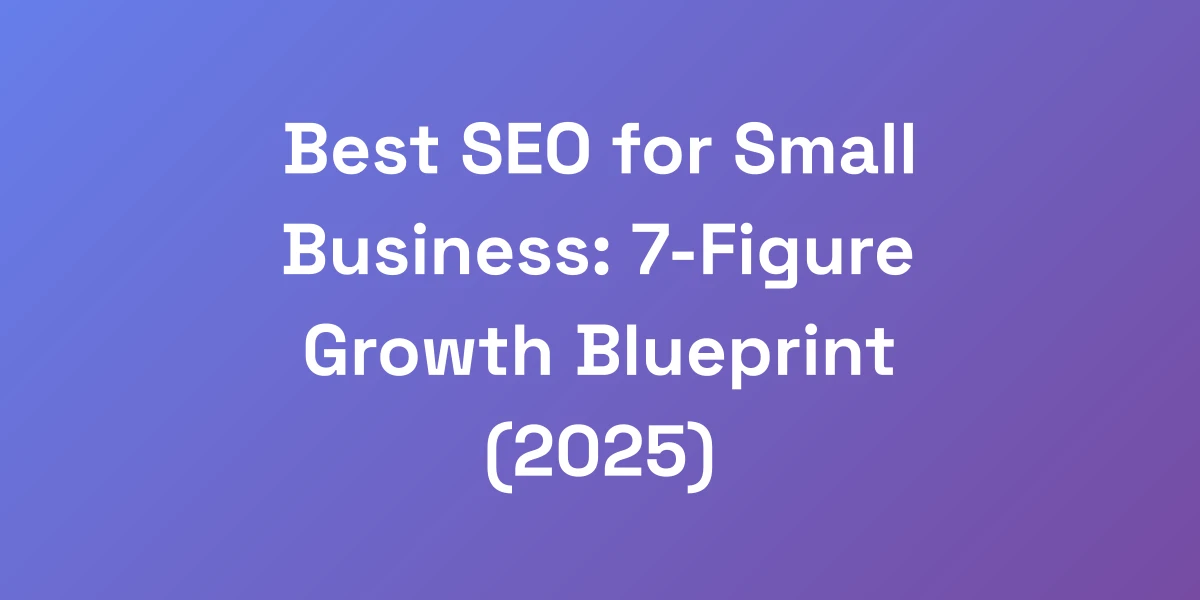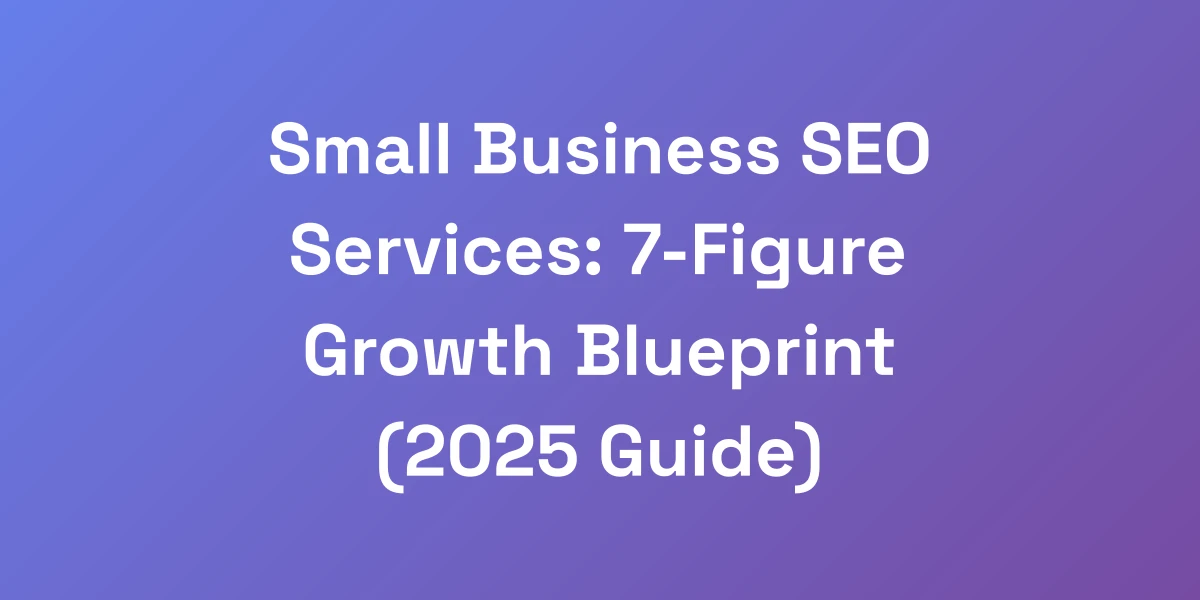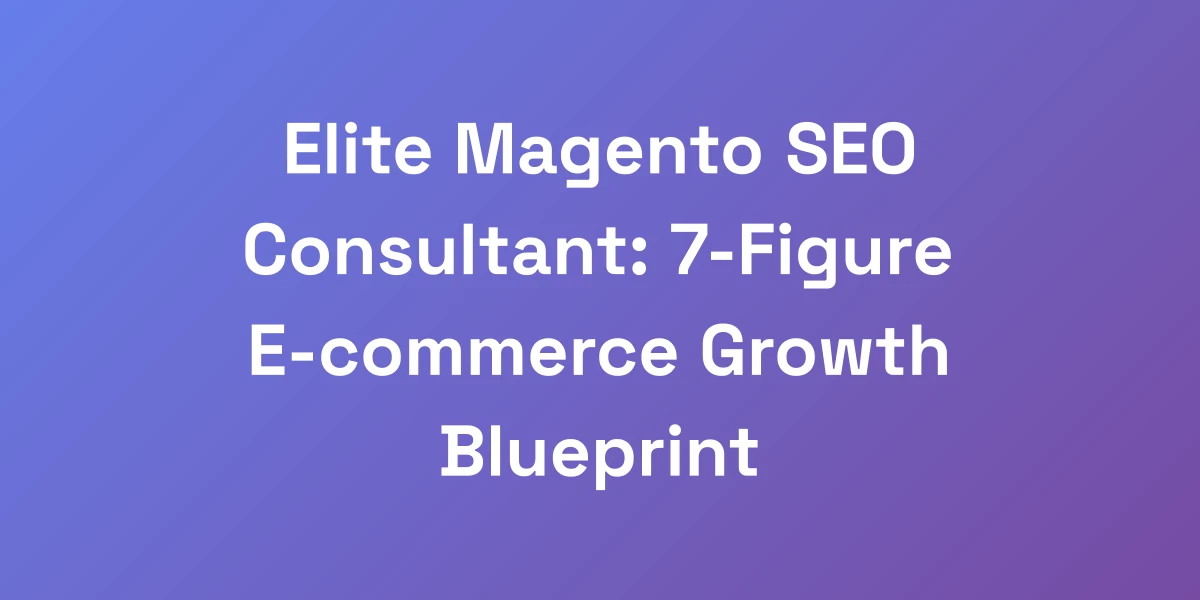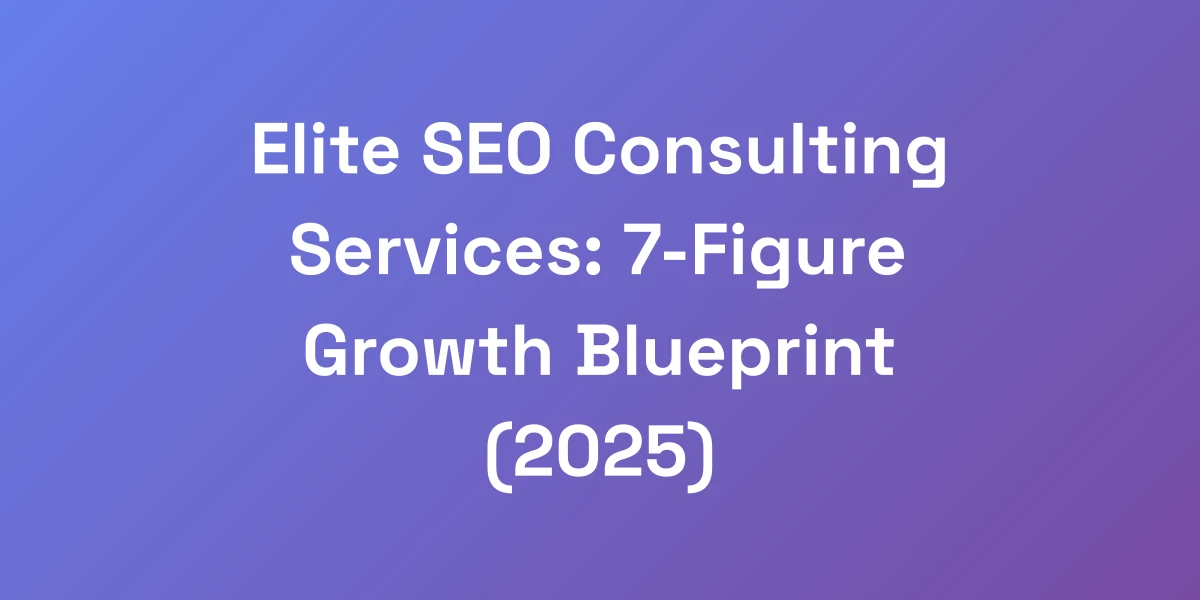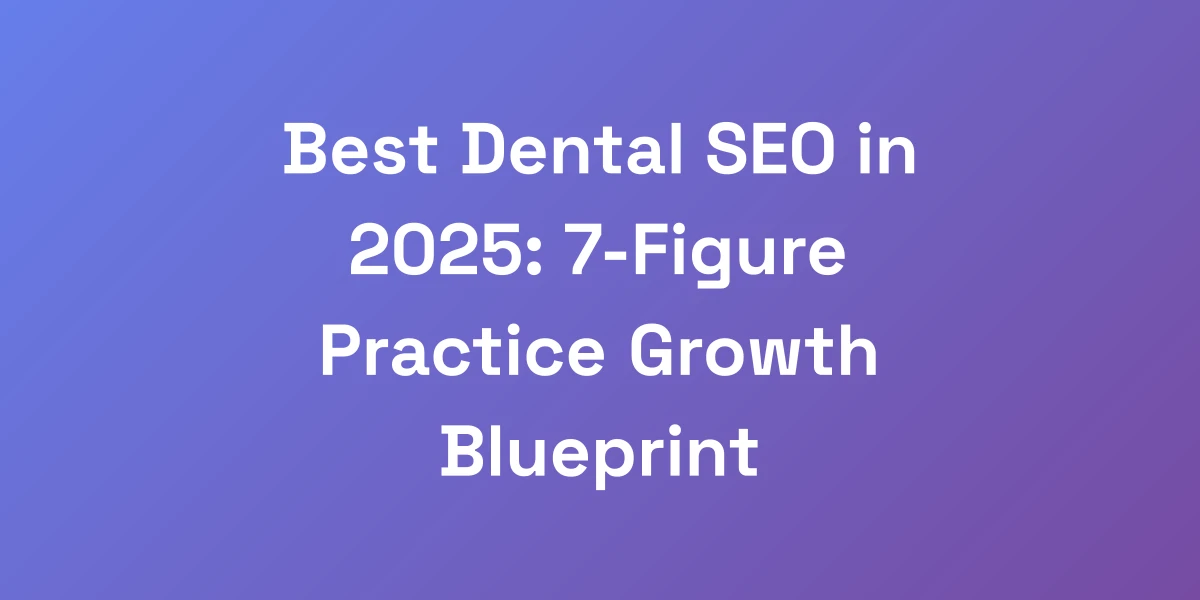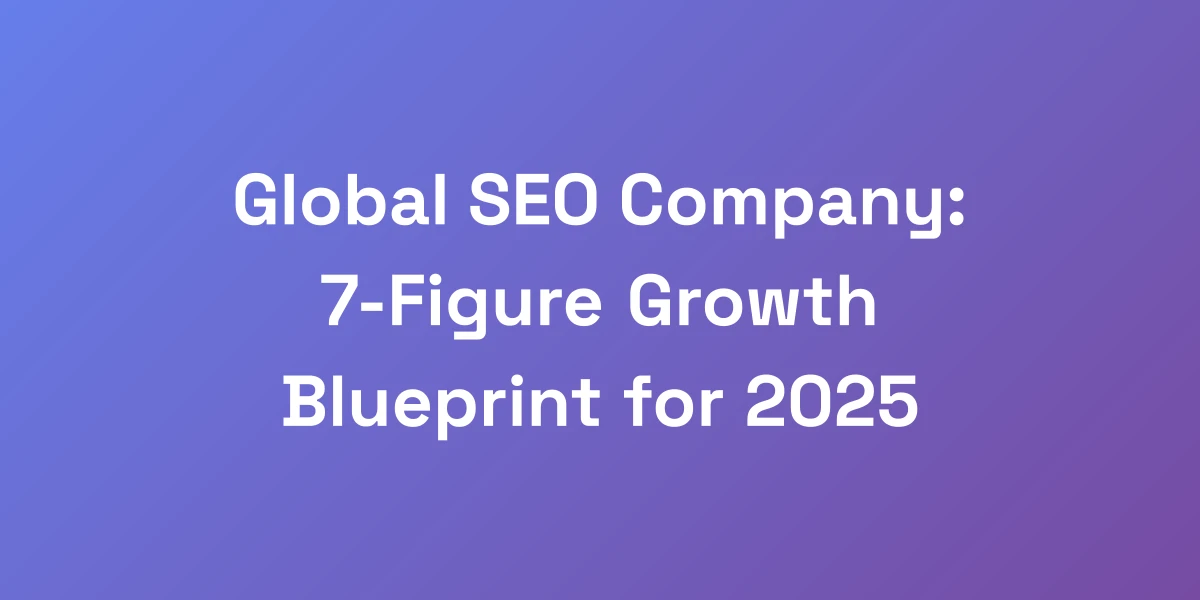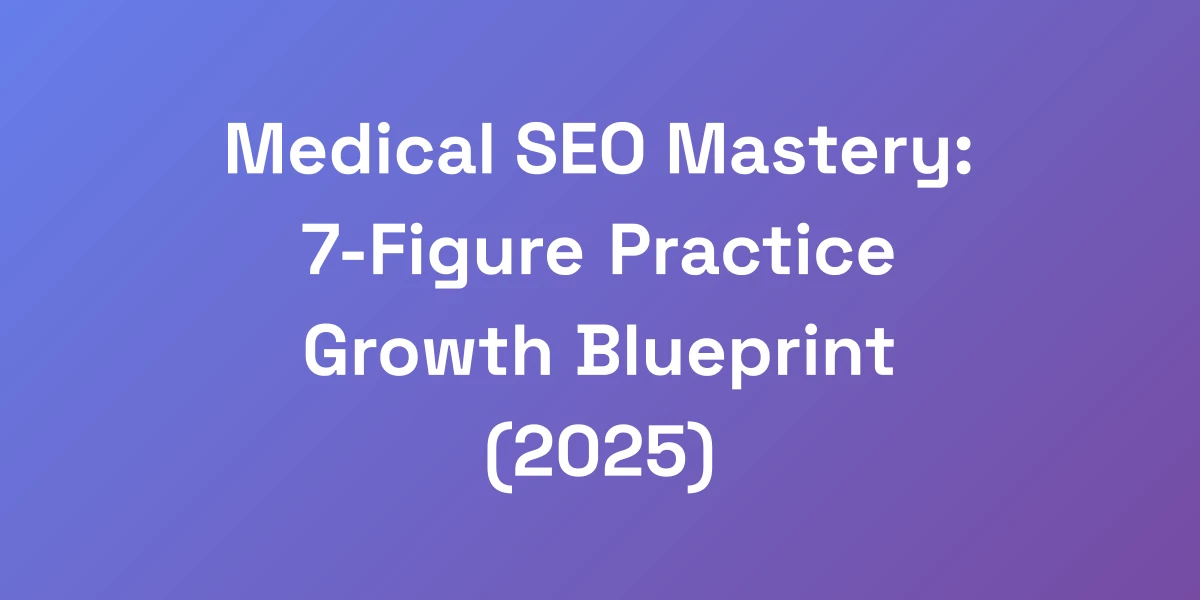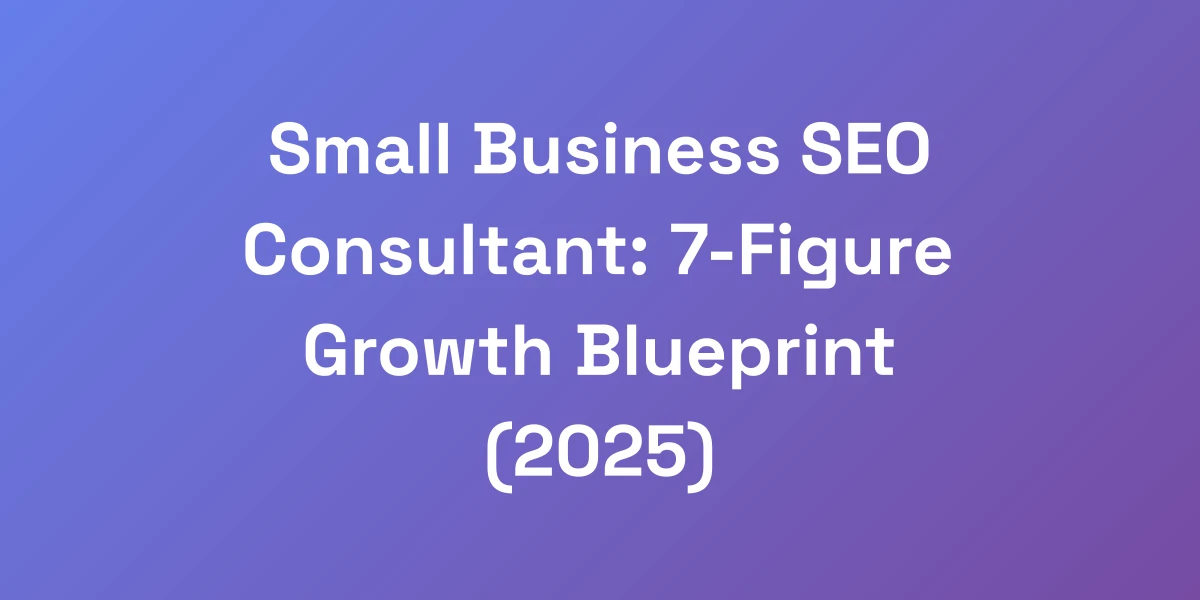
Small Business SEO Consultant: 7-Figure Growth Blueprint (2025)
Mar 22, 2025 | By [email protected]
Are you tired of watching your small business bleed money on SEO strategies that don’t deliver?
We get it. Navigating the complex world of search engine optimization can feel like trying to find a needle in a haystack. And with so many SEO consultants out there, how do you know who to trust?
Let’s cut through the noise. Most small businesses fail at SEO because they’re chasing the wrong metrics, hiring the wrong people, and expecting magic results overnight. But what if we told you there’s a systematic 7-figure growth blueprint that can transform your SEO efforts into a revenue-generating machine?
In this blueprint, we’ll dive deep into the strategies that separate the winners from the losers, ensuring your investment in SEO not only pays off but skyrockets your business to new heights.
Ready to turn your SEO game around? Let’s get started.
Why Most Small Businesses Fail at SEO (And How to Fix It)
Let’s be brutally honest – 90% of small businesses are hemorrhaging money on SEO because they’re doing it wrong. We’ve consulted for hundreds of companies, and we keep seeing the same mistakes: chasing vanity metrics, hiring the cheapest provider, and expecting overnight results. Here’s the truth – SEO isn’t about tricks or hacks. It’s about building a systematic revenue-generating machine that consistently brings qualified buyers to your business. In this guide, we’ll show you exactly how to find and work with an SEO consultant who can actually deliver ROI, not just empty promises.
The Real Cost of Bad SEO Decisions
Investing in SEO is a long-term commitment, and bad decisions can cost you dearly. Think about the money wasted on ineffective strategies that do nothing but inflate your analytics with empty numbers. This is money that could have been reinvested into marketing channels that actually convert.
- Lost Revenue: Ineffective SEO means fewer leads and sales, directly impacting your bottom line.
- Wasted Resources: Time and money spent on the wrong strategies could have been allocated to more effective marketing efforts.
- Reputational Damage: Poor SEO practices can harm your online reputation, making it harder to attract and retain customers.
Imagine pouring resources into a campaign that only brings superficial results. It’s like setting up a billboard in the middle of the ocean – impressive, but no one sees it.
Why Traditional SEO Agencies Don’t Work for Small Business
Traditional SEO agencies often adopt a one-size-fits-all approach, which rarely works for small businesses. They might offer generic solutions that don’t address your specific needs or industry nuances. Moreover, many agencies prioritize quick wins over sustainable growth, leading to temporary spikes in traffic that don’t translate into long-term success.
- Lack of Personalization: Generic strategies fail to address the unique challenges and opportunities of your business.
- Poor Communication: Traditional agencies often lack transparency, leaving you in the dark about what’s working and what’s not.
- Short-Term Focus: Quick fixes might boost rankings temporarily but don’t build a foundation for lasting growth.
We believe in customization. Your business is unique, and your SEO strategy should be too.
The New Framework for SEO Success in 2025
SEO is evolving, and to stay ahead, you need a framework that adapts to these changes. Our new framework for SEO success in 2025 emphasizes data-driven strategies, user experience, and sustainable growth.
- Data-Driven Decision Making: Utilize analytics to guide your strategies and measure success accurately.
- User Experience (UX): Focus on creating a seamless and engaging experience for your website visitors.
- Content Quality: Prioritize high-quality, relevant content that meets the needs of your target audience.
- Technical SEO: Ensure your website is technically sound, with fast load times, mobile optimization, and secure connections.
- Continuous Optimization: SEO is not a set-it-and-forget-it game. Ongoing adjustments and improvements are crucial.
This framework isn’t about quick wins; it’s about building a robust foundation that supports long-term growth.
Key Metrics That Actually Matter for Growth
So, which metrics should you really be tracking? While it’s tempting to focus on vanity metrics like sheer traffic numbers, the real indicators of SEO success are those that drive revenue and growth.
- Conversion Rates: The percentage of visitors who take a desired action on your site.
- Qualified Leads: Leads that fit your target customer profile and show potential for conversion.
- Return on Investment (ROI): The revenue generated from your SEO efforts compared to the cost invested.
- Organic Traffic: Visitors who find your site through search engines, specifically those from high-intent keywords.
- Engagement Metrics: Metrics like bounce rate, average session duration, and pages per session that indicate user engagement.
Focusing on these metrics ensures you’re not just attracting any traffic, but the right traffic that converts.
Setting Realistic Timeline and ROI Expectations
SEO is not an overnight success story. Setting realistic timelines and ROI expectations is crucial for maintaining motivation and measuring success accurately.
- Short-Term Goals: Initial improvements in website structure, keyword rankings, and on-page SEO.
- Medium-Term Goals: Increased organic traffic, better user engagement, and more qualified leads.
- Long-Term Goals: Sustained growth, higher conversion rates, and significant ROI.
Understanding that SEO takes time allows you to stay patient and committed, ensuring that the strategies you implement yield the desired results over time.
How to Identify a Results-Driven SEO Consultant
Stop falling for fancy presentations and vanity metrics. A true SEO consultant worth their salt will be obsessed with one thing – your bottom line. They should be able to show you exactly how their strategy will translate into revenue, not just rankings. We’re going to show you the exact questions to ask, red flags to watch for, and what a legitimate SEO proposal should look like. The best consultants will have a proven track record of generating actual business results, not just throwing around buzzwords like “backlinks” and “optimization.”
Essential Qualifications and Red Flags
When searching for an SEO consultant, certain qualifications can set the true experts apart from the pretenders.
- Proven Track Record: Look for consultants who can demonstrate past successes with real data and case studies.
- Transparent Practices: They should be open about their methods and willing to explain their strategies in detail.
- Up-to-Date Knowledge: SEO is constantly evolving, and good consultants stay current with the latest trends and algorithm changes.
- Red Flags: Beware of consultants who guarantee top rankings quickly, use black-hat techniques, or lack clear communication.
Remember, if it sounds too good to be true, it probably is.
Case Study Analysis Framework
Evaluating a consultant’s case studies is essential. Here’s how to analyze them effectively:
- Relevance: Ensure their case studies align with your industry and business size.
- Specific Metrics: Look for detailed metrics such as traffic increases, conversion rate improvements, and ROI figures.
- Time Frame: Assess the timeline in which they achieved these results. Sustainable growth over time is a good sign.
- Client Testimonials: Genuine feedback from previous clients can provide insights into their working style and effectiveness.
A solid case study should paint a clear picture of how the consultant achieved tangible results for their clients.
Pricing Models That Align With Results
Understanding different pricing models helps you choose one that aligns with your business goals and budget.
- Monthly Retainers: A fixed fee each month for ongoing SEO services. Best for long-term commitment.
- Hourly Rates: Pay for the time spent on SEO tasks. Suitable for specific projects or consultations.
- Project-Based Fees: A one-time payment for a defined set of SEO services. Ideal for short-term goals.
- Performance-Based Pricing: Pay based on the results achieved, such as traffic increases or leads generated.
Choose a pricing model that incentivizes your consultant to deliver results rather than just work.
Communication and Reporting Standards
Clear communication and regular reporting are non-negotiable for successful SEO partnerships.
- Regular Updates: Weekly or monthly updates to keep you informed of progress and changes.
- Detailed Reports: Comprehensive reports that include key metrics, progress against goals, and actionable insights.
- Accessible Communication: Easy access to your consultant for questions, feedback, and strategy adjustments.
- Transparency: Open discussion about what’s working and what needs improvement.
Effective communication ensures that you’re always in the loop and can make informed decisions based on accurate key metrics.
Technology Stack and Tools Assessment
The right tools can make or break your SEO strategy. Assessing your consultant’s tech stack is crucial.
- Analytics Platforms: Tools like Google Analytics and Google Search Console for tracking performance.
- Keyword Research Tools: SEMrush, Ahrefs, or Moz for identifying high-intent keywords.
- Content Management: Platforms and tools that help in creating and optimizing content effectively.
- Technical SEO Tools: Screaming Frog, GTmetrix, or similar for site audits and performance monitoring.
Ensure your consultant is utilizing industry-standard tools that provide the insights and capabilities needed for comprehensive SEO strategies.
The Small Business SEO Success Formula
Here’s what separates successful small business SEO from everyone else – it’s all about the money-making metrics. Forget about vanity metrics like traffic or rankings. Your SEO consultant needs to focus on three key areas: identifying high-intent keywords that actually convert, creating content that pre-frames the sale, and building authority that makes you the obvious choice. We’ll break down the exact systematic approach that has generated millions in revenue for our clients.
High-ROI Keyword Selection Strategy
Not all keywords are created equal. Identifying high-ROI keywords is the foundation of a successful SEO strategy.
- Intent-Focused Keywords: Target keywords that indicate a strong purchase intent, ensuring higher conversion rates.
- Long-Tail Keywords: These are less competitive and more specific, attracting qualified leads.
- Competitive Analysis: Analyze your competitors to identify keyword gaps and opportunities.
- Volume vs. Value: Balance search volume with the potential value each keyword brings.
By focusing on the right keywords, you ensure that your SEO efforts are driving traffic that’s more likely to convert.
Content That Converts Visitors into Buyers
Content is king, but not all content is created equal. Automated blogging can help you create content that pre-frames the sale, which is essential for turning visitors into customers.
- Educational Content: Provide valuable information that educates your audience and builds trust.
- Sales-Focused Content: Incorporate calls-to-action and persuasive elements that encourage conversions.
- Content Diversification: Use a mix of blog posts, videos, infographics, and other formats to engage different audience segments.
- Content Optimization: Ensure that all content is optimized for SEO, including proper use of keywords, meta descriptions, and headings.
High-converting content not only attracts visitors but also guides them through the buyer’s journey, increasing the likelihood of a sale.
Local SEO Domination Tactics
For many small businesses, local SEO is the key to attracting nearby customers. Domination in local SEO can significantly boost your visibility and foot traffic.
- Google My Business Optimization: Ensure your GMB profile is fully optimized with accurate information, images, and posts.
- Local Citations: Build consistent and accurate citations across all relevant directories.
- Customer Reviews: Actively manage and respond to customer reviews to build trust and authority.
- Localized Content: Create content that speaks directly to your local audience, incorporating local keywords and themes.
By mastering local SEO, you position your business as a prominent player in your community, attracting customers who prefer local services.
Authority Building Framework
Building authority is about establishing your business as a trusted leader in your industry.
- High-Quality Backlinks: Acquire backlinks from reputable and relevant websites through white label link building to boost your domain authority.
- Content Marketing: Publish authoritative content that showcases your expertise and knowledge.
- Public Relations: Engage in PR activities that increase your visibility and credibility.
- Social Proof: Leverage testimonials, case studies, and endorsements to build trust with your audience.
Authority not only improves your SEO rankings but also makes your business the go-to choice for customers in your niche.
Technical SEO Essentials
Technical SEO is the backbone of any successful SEO strategy. Without a sound technical foundation, your site can’t fully capitalize on your SEO efforts.
- Site Speed: A fast-loading website enhances user experience and improves search rankings.
- Mobile Optimization: Ensure your site is fully responsive and performs well on all devices.
- Secure Website: Use HTTPS to secure your site, which is a ranking factor for Google.
- Structured Data: Implement schema markup to help search engines better understand your content.
- XML Sitemaps and Robots.txt: Properly configure these to ensure efficient crawling and indexing.
Mastering technical SEO ensures that your website is accessible, user-friendly, and primed for top search engine rankings.
Creating Your SEO Implementation Roadmap
Let’s get tactical. Your SEO consultant should provide you with a clear, actionable roadmap that shows exactly how they’ll get you from where you are to where you want to be. No fluff, no jargon – just pure execution. We’re going to show you what a real 6-month SEO plan looks like, including specific milestones, deliverables, and ROI tracking mechanisms. This is the same framework we’ve used to help businesses go from zero to generating consistent leads within 90 days.
Month-by-Month Action Plan
A detailed month-by-month plan ensures that every step of your SEO strategy is executed systematically.
- Month 1: Comprehensive SEO audit, keyword research, and initial on-page optimizations.
- Month 2: Content creation and optimization, technical SEO improvements.
- Month 3: Link-building campaigns and local SEO enhancements.
- Month 4: Advanced content strategies and user experience improvements.
- Month 5: Continued link-building, authority building, and performance monitoring.
- Month 6: Review and optimization based on performance data, scaling successful strategies.
Each month builds on the previous one, ensuring a cohesive and comprehensive approach to SEO.
Resource Allocation Guide
Effective SEO requires the right resources. Allocating your budget and manpower wisely can make all the difference. Determine how much you can invest in different aspects of SEO, such as content creation, technical improvements, and link-building.
- Budget Allocation: Determine how much you can invest in different aspects of SEO, such as content creation, technical improvements, and link-building.
- Team Roles: Assign specific roles and responsibilities to your team members or your consultant to ensure clarity and accountability.
- Tool Investments: Invest in essential SEO tools that provide the data and insights needed to drive your strategy.
- Training and Development: Ensure your team is up-to-date with the latest SEO best practices and trends.
Proper resource allocation ensures that your SEO strategy is well-supported and can be executed effectively.
Progress Tracking Systems
Tracking your progress is crucial for understanding what’s working and what needs adjustment.
- Analytics Tools: Use tools like Google Analytics and SEMrush to monitor traffic, conversions, and other key metrics.
- Regular Reporting: Set up regular reporting intervals to review performance and make data-driven decisions.
- Goal Tracking: Align your tracking systems with your SEO goals to measure success accurately.
- Adjustments and Tweaks: Use the data to make informed adjustments to your strategy, ensuring continuous improvement.
With robust tracking systems in place, you can stay on top of your SEO performance and make proactive adjustments to maximize results.
ROI Measurement Framework
Measuring ROI helps you understand the value your SEO efforts are bringing to your business.
- Revenue Tracking: Connect your SEO strategies to revenue generated, whether through direct sales or lead conversions.
- Cost Analysis: Compare the costs invested in SEO against the revenue generated to calculate ROI accurately.
- Performance Metrics: Use key performance metrics like conversion rates and lead quality to gauge the effectiveness of your SEO efforts.
- Long-Term Value: Consider the long-term benefits of SEO, such as sustained traffic and brand authority, in your ROI calculations.
A clear ROI framework ensures that your investments in SEO are justified and driving meaningful business growth.
Scaling Strategies for Growth
Once you’ve established a solid foundation, scaling your SEO efforts can lead to exponential growth.
- Expand Keyword Targets: Identify and target additional high-intent keywords to capture more market share.
- Content Expansion: Broaden your content strategy to include more formats and topics, increasing engagement and authority.
- Advanced Link-Building: Implement sophisticated link-building tactics to further boost your domain authority.
- Market Expansion: Apply your SEO strategies to new markets or geographical areas to drive growth.
Scaling effectively leverages your existing successes to drive even greater results, ensuring sustained and accelerated growth.
Maximizing Your SEO Investment Return
Here’s the truth about SEO ROI – it’s not just about rankings, it’s about building a sustainable customer acquisition system. Your SEO consultant should be focused on creating multiple revenue streams through search visibility. We’ll show you how to structure your investment for maximum returns, including how to leverage your SEO efforts across multiple marketing channels for compound growth effects.
ROI Optimization Strategies
Optimizing your ROI means ensuring that every dollar spent on SEO is generating maximum returns.
- Efficient Budget Allocation: Focus on high-ROI strategies like content marketing and technical SEO improvements.
- Performance-Based Adjustments: Continuously refine your strategies based on performance data to maximize results.
- Cost-Effective Tactics: Implement tactics that yield high returns without breaking the bank, such as optimizing existing content instead of constantly creating new pieces.
- Automation Tools: Utilize SEO automation tools to streamline processes and reduce manual efforts, saving time and money.
By optimizing your strategies, you ensure that your SEO investments are driving the highest possible returns.
Cross-Channel Synergy Tactics
Leveraging SEO across multiple marketing channels can create synergy, enhancing the overall effectiveness of your marketing efforts.
- Content Marketing: Use your SEO-optimized content across social media, email marketing, and other channels to increase reach and engagement.
- Pay-Per-Click (PPC) Integration: Combine SEO and PPC strategies to dominate search results and capture more traffic.
- Email Marketing: Drive traffic to your SEO-optimized content through targeted email campaigns.
- Social Media: Amplify your SEO efforts by promoting content on social platforms, increasing visibility and backlinks.
Cross-channel synergy ensures that your SEO efforts are reinforced and amplified across various platforms, driving compound growth.
Long-term Value Creation
SEO is a marathon, not a sprint. Focusing on long-term value creation ensures sustained growth and continued ROI.
- Consistent Content Creation: Keep producing high-quality content that remains relevant and valuable to your audience over time.
- Brand Authority: Continually build your brand’s authority through thought leadership, quality backlinks, and user trust.
- Ongoing Optimization: Regularly update and optimize your SEO strategies to adapt to changing algorithms and market conditions.
- Customer Retention: Use SEO to enhance customer retention by providing valuable content and maintaining strong online relationships.
By focusing on long-term value, you ensure that your SEO efforts continue to pay dividends well into the future.
Risk Mitigation Approaches
Every investment comes with risks, and SEO is no exception. Mitigating these risks ensures that your strategies remain effective and sustainable.
- Staying Updated: Keep abreast of the latest SEO trends and algorithm updates to adapt your strategies accordingly.
- Diversification: Diversify your SEO tactics to avoid over-reliance on a single strategy or channel.
- Compliance: Ensure your SEO practices comply with search engine guidelines to avoid penalties and protect your rankings.
- Backup Plans: Develop contingency plans for potential setbacks, such as algorithm changes or loss of key backlinks.
Risk mitigation helps protect your SEO investments, ensuring that your strategies remain resilient in the face of challenges.
Performance-Based Optimization
Constantly optimizing based on performance data ensures that your SEO strategies remain effective and aligned with your business goals.
- Regular Audits: Conduct regular SEO audits to identify areas for improvement and capitalize on new opportunities.
- Data-Driven Decisions: Use performance data to guide strategic adjustments and refinements.
- A/B Testing: Implement A/B testing for various SEO tactics to determine what works best for your business.
- Continuous Learning: Encourage a culture of continuous learning and improvement to stay ahead of the competition.
Performance-based optimization ensures that your SEO strategies are always evolving and improving, driving sustained growth and maximizing ROI.
Conclusion
Building a successful SEO strategy for your small business isn’t just about chasing rankings – it’s about creating a robust, revenue-generating machine that stands the test of time. We’ve walked you through why most small businesses fail at SEO and how to avoid those pitfalls by selecting the right consultant who focuses on your bottom line.
From identifying high-ROI keywords to creating converting content and building unwavering authority, the blueprint outlined here is designed to propel your business to 7-figure growth by 2025. Remember, SEO is a marathon, not a sprint. Stay committed, track your progress rigorously, and continuously optimize your SEO strategies to unlock unparalleled growth.
Ready to transform your SEO efforts into a powerhouse of growth? Reach out to an SEO consultant who understands your unique needs and can implement this blueprint effectively. Let’s make 2025 your breakout year. What’s your next step to SEO success?
We’d love to hear your thoughts and experiences. Share your SEO challenges and triumphs in the comments below or reach out to us directly. Let’s grow together.
